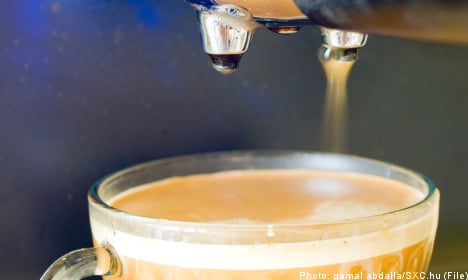The measurements were carried out on coffee machines at the Stockholm-based Institute of Environmental Medicine (IMM) at Karolinska Institutet and on those found at a construction company, Sveriges Television (SVT) reports.
The lead was found to be leaking from brass components in the coffee machines, leading to lead levels of up to 150 microgrammes per litre of water.
According to Sweden’s National Food Administration (Livsmedelsverket), the upper-limit of acceptable levels of lead in drinking water is 10 microgrammes per litre.
Prolonged exposure or ingestion of lead can cause damage to the nervous system, as well as blood and brain disorders. Lead exposure can also cause developmental problems for unborn children and lead to miscarriages.
Following the tests, the IMM has issued a warning to all Swedish workplaces to check the lead levels in the water found in their coffee vending machines.
The measurements have so far been carried out on one model of coffee vending machine, the Arena 4010 manufactured by De Jong Duke and rented out to Swedish workplaces by Café Bar in Norrköping in eastern Sweden.
The company has rented out 1,5000 Arena 4010 coffee machines across the country, corresponding to approximately 1 percent of the 95,000 to 100,000 coffee vending machines in Sweden, according to Benny Petersson from Svenska vendingföreningen, a vending machine industry organisation.
“We view this with the utmost seriousness,” he told the TT news agency.
“But we should also bear in mind that several random tests on this type of machine didn’t show high lead levels and that the machines aren’t especially common.”
According to the National Food Administration, there are strict requirements that equipment used to handle food not leak lead to the extent revealed in the IMM tests.
“It’s quite striking and not acceptable, even if this was found in a single study,” Jan Sjögren, head of agency’s inspection support division, told TT.
He recommends that all companies who rent or distribute coffee vending machines in Sweden now test the water in their machines for elevated levels of lead.
“There’s every reason think again. We’re a nation of coffee drinkers and this it’s not acceptable that we are ingesting lead unnecessarily like this,” said Sjögren.



 Please whitelist us to continue reading.
Please whitelist us to continue reading.
Member comments